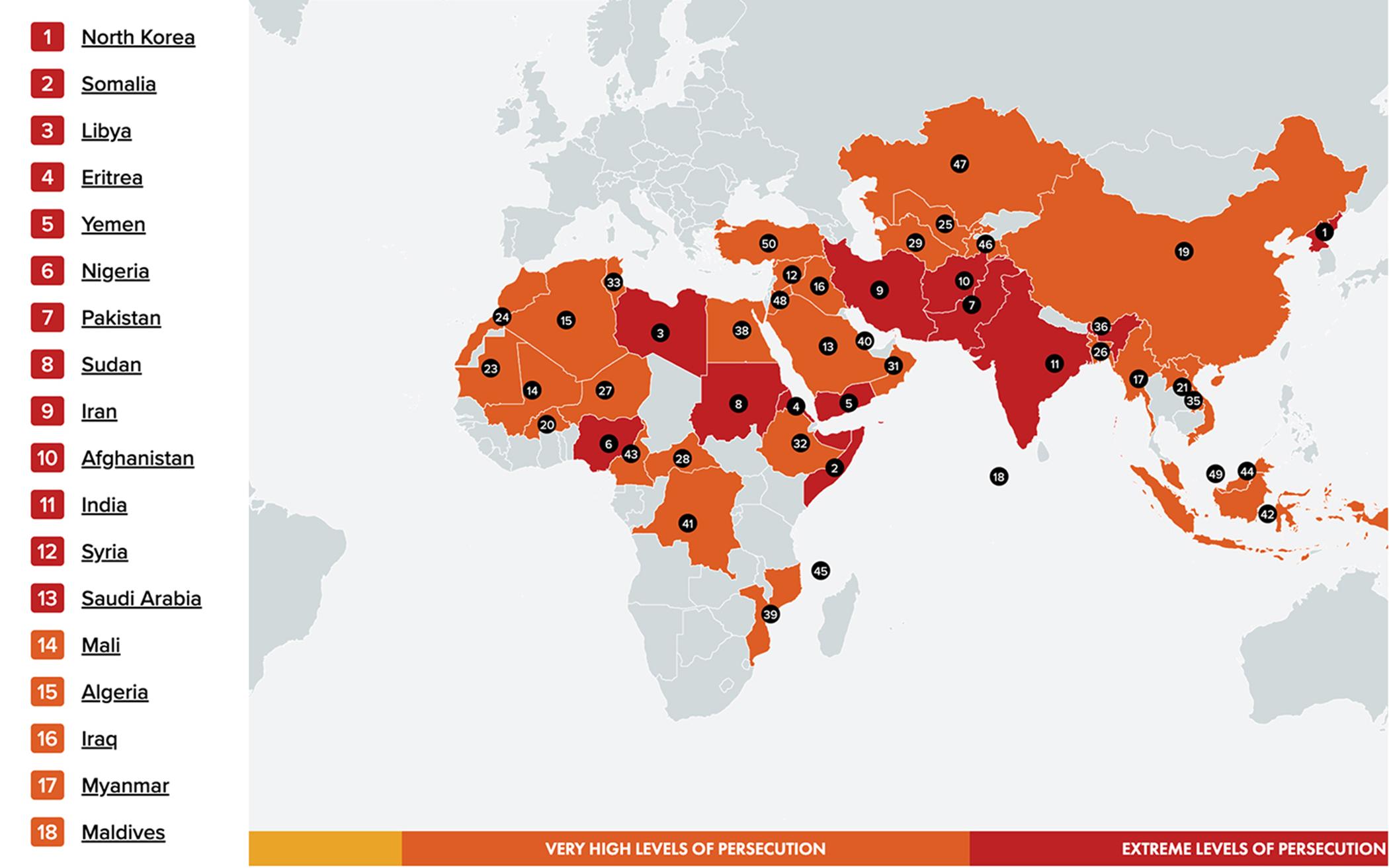The Banner has a subscription to republish articles from Religion News Service. This story by Fiona André was published on religionnews.com Jan. 17, 2024. It has been edited for Banner style. A paragraph with context for the Christian Reformed Church has been added.
In its annual list detailing countries of concern when it comes to persecution against Christians, the watchdog organization Open Doors International highlighted outbreaks of violence against sub-Saharan African Christians, where 16.2 million were forced out of their homes at the end of 2022. (The 2024 list looked at attacks against Christians from October 2022 to September 2023.)
The report is based on data collected by field workers, experts and persecution analysts and is published at the beginning of every year to track discrimination and violence against Christians. Countries are ranked based on the severity of the threats faced by Christian communities there.
This year’s report notes that violence against sub-Saharan African Christians, a long-term problem according to the organization, is the consequence of actions by autocratic regimes and jihadist groups.
“Christians are purposefully targeted or extra vulnerable in a continent that is beset by the twin problems of radical Islamic elements and increasingly autocratic regimes. This is the ever-growing threat for Christians south of the Sahara Desert and, if left unchecked, these twin pressures are expected to overwhelm them and force them out of their homes and villages,” wrote Frans Veerman, Open Doors World Watch Research’s managing director, in a statement.
More than 82% of Christians killed for their faith globally this year were in Nigeria, according to the organization, which has the country ranked sixth on the 2024 list. Boko Haram, the jihadist group responsible for the abduction of 276 Christian schoolgirls in 2014, though still active, has ceded power to the Sunni Islamic extremist group ISWAP, which has extended its influence into majority Christian southern Nigeria.
Violence against Christian communities is particularly concerning in the Plateau state of Nigeria, which has seen a rise in attacks against rural communities by armed gangs.
Voids in governance and security plague countries of the region and have given jihadist groups occasions to take control over certain areas, the report said.
In Mali, the Russian paramilitary group Wagner, which is there as an ally of the current military junta in power, has expanded its presence and made it harder for local Christian communities, per the list.
“Their influence has significantly stifled the civic space for Christians,” according to the organization.
The Wagner group, formerly run by President Vladimir Putin’s ally Yevgeny Prigozhin, until he died in 2023, was involved in several abuse cases conducted with the Malian army, according to Human Rights Watch. It is also present in other African countries—including Libya, Central African Republic, Sudan Faso—and has replaced other Western powers in the region.
Christians fear being associated with voices who criticized the presence of Wagner on the continent, according to Open Doors.
The new Malian Constitution, which includes a recognition of Christians as a minority, could improve Christians’ living conditions in the country, according to Open Doors. The text, which intends to prepare a return to civilian rule, was approved in June in a referendum with 97% of the vote.
The report also noted the growing influence of the Islamic Allied Democratic forces in war-torn Congo.
This year’s World Watch List included actions taken against Christians by their governments. North Korea, at the top of the list for many years, continues to track illegal house churches and condemn Christians to “hard labor,” according to the organization.
China increased its crackdown on house churches through a set of “old and new authoritarian measures,” explained the watchdog group. Thousands of churches closed in the past year, and 83% of closures documented in the report happened in China and India.
The report also describes a degrading climate for Christians in Nicaragua due to President Daniel Ortega’s anti-clergy policies. Last August, the government confiscated the University of Central America, a Jesuit-run institution, accusing it of being a “center for terrorism.”
In February 2023, Bishop Rolando Álvarez was sentenced to 26 years in prison for “criticizing religious freedom conditions.” The bishop of Matagalpa was released Jan. 16 with 18 other priests after negotiations with the Vatican.
Open Doors also raised the alarm on the situation for Indian Christians and reported a rise in Christian killings and attacks on Christian schools and hospitals in that country.
Last May’s ethnic violence in northeastern India, between the Kuki Christian minority and the Meitei, Manipur’s biggest and largely Hindu ethnic group, led to the death of 160 Christians and forced thousands more out of their homes.
The organization said the ouster of Prime Minister Narendra Modi’s Hindu nationalist party from India’s southern Karnataka state might improve the situation for Christians there, as long-standing anti-conversion laws are repealed.
The Christian Reformed Church encourages member congregations to mark the International Day of Prayer for the Persecuted Church in November each year. In 2023 the focus was on Christians in Afghanistan, the country that is 10th on Open Doors’ 2024 list.
The 2024 top 10 list is:
* North Korea
* Somalia
* Libya
* Eritrea
* Yemen
* Nigeria
* Pakistan
* Sudan
* Iran
* Afghanistan
c. 2024 Religion News Service
About the Author
Religion News Service is an independent, nonprofit and award-winning source of global news on religion, spirituality, culture and ethics.

